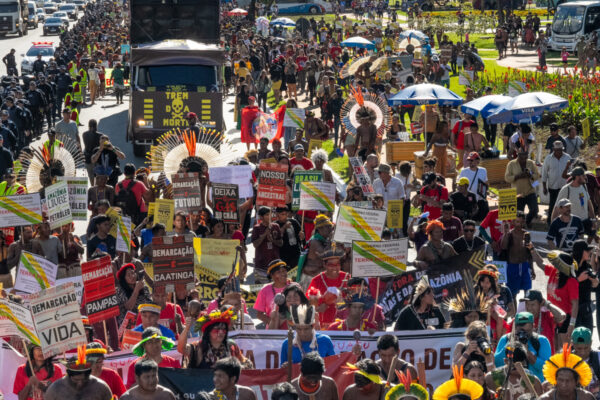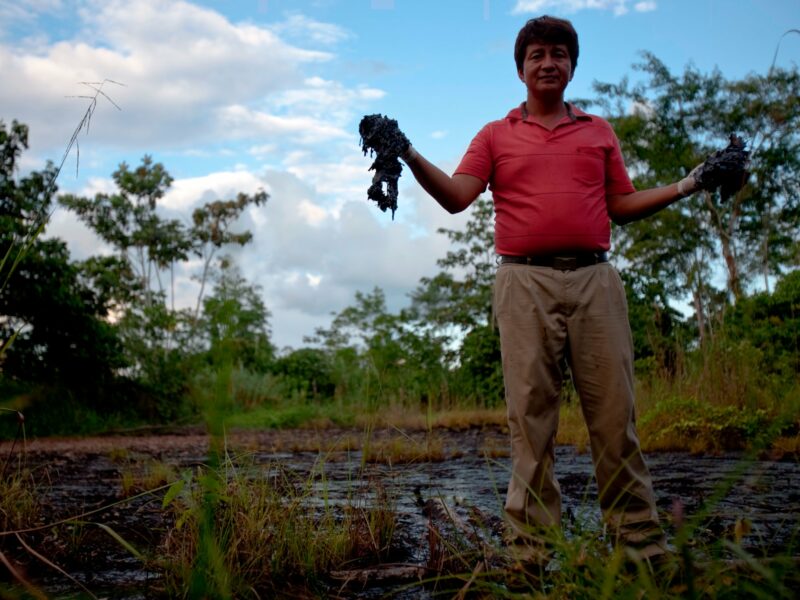Two months ago, Chevron released statements and videotapes provided by two men that it said cast doubt on the integrity of a court in Ecuador, where the company is fighting demands that it pay billions of dollars to fix damage done years ago by oil exploration in the Ecuadoran Amazon.
But on Thursday doubt was cast on the integrity of one of those men by Amazon Watch, a group associated with the plaintiffs in the case against Chevron. Citing public records, the group said that Wayne Hansen, described by Chevron as “an American businessman,” was found guilty and served jail time in a 1986-87 drug case for conspiring to import 275,000 pounds of marijuana. In addition, the group said, Hansen had a series of legal scuffles in his hometown of Bakersfield, Calif. He lost civil lawsuits for an attack by his pit bulls on a neighbor and for damaging a neighbor’s wall with a jackhammer, the Associated Press said.
The Post confirmed that Hansen was indicted in Texas in a 1986 drug case and that he lost a $5,000 small-claims-court dispute in 2007 (which he failed to pay), a $8,846 civil judgment in 1998, and a $2,527 judgment in 1992.
ad_icon
“The man they’ve portrayed as a Good Samaritan is actually a convicted drug trafficker who has led a life that has skirted the edge of the law for many years,” said Steve Donziger, a New York lawyer representing people who live in the Amazon in the long-running legal battle. “Chevron either never disclosed this information about Hansen or never looked into who he was. Either of those revelations would be stunning for a large company trying to make the claims it has about this case.”
Trevor Melby, a lawyer for Hansen, confirmed Hansen’s legal history, but said, “I don’t believe that it changes what was shown on the tapes. The tapes that were made really speak for themselves.” He also asserted that Hansen worked for himself. “The previous question was whether he worked for Chevron or whether I did, and the answer to both questions is no,” Melby said.
Chevron reiterated on Thursday that Hansen’s background did not alter the evidence it said appeared in videotapes he made with a former Chevron contractor, Diego Borja. Hansen and Borja said that in order to obtain environmental remediation contracts, they were asked to pay a $3 million bribe to a person who identified himself as an official from Ecuador’s ruling party. That person then arranged for the judge to attend what Chevron called an “inappropriate meeting” with Hansen and Borja.
Chevron asserts that the videotape of that meeting, made with spy cameras in a watch and a pen, shows that the judge led the two men to believe that he had already decided the case against Chevron. Separately, the person who said he was a party official said the judge would get $1 million of the bribe.
“Chevron does not believe it can get a fair trial in this case,” said company spokesman Donald Campbell.
But Amazon Watch says it isn’t clear from the videotape whether the judge understood the questions Hansen was asking or that anything he said suggested corruption in the case.
The judge, Juan Evangelista Nunez, said that the video was edited and misconstrued and that he agreed to meet Hansen and Borja as a favor to a friend to explain the lawsuit. But Nunez recused himself anyway.
Amazon Watch also said that there wasn’t any evidence that Hansen had ever worked for any company involved in environmental remediation. It quoted news reports suggesting that the person who claimed to be an official of Ecuador’s ruling party wasn’t actually a party official.
Now Ecuadoran authorities are investigating what connections, if any, Hansen and Borja had with Chevron prior to making the videotapes. “Chevron has had no past association with Mr. Hansen,” said Chevron’s Campbell. He added that “Mr. Borja brought the videos to Chevron’s attention.”
Both men are in the United States. Chevron has said that it is currently providing financial assistance to Borja, who said in an affidavit that he moved to the United States with his family for fear for his safety if he remained in Ecuador. Thomas F. Cullen Jr., a senior partner at Jones Day and outside counsel for Chevron, said that Chevron offered to pay for a lawyer for Hansen but that Hansen had not taken them up on it.
The 15-year-old lawsuit involves damage allegedly left by Texaco, which sold its holdings to PetroEcuador and which was later acquired by Chevron. Chevron says that Texaco fulfilled its cleanup obligations specified in the agreement with PetroEcuador and that the state-owned firm is solely responsible for the rest.
Cullen rejected the notion that Chevron had recruited Hansen to make the videotapes. “I’m going to go out and recruit someone for this job and I’m going to go out and get that guy? It’s baloney,” Cullen said. “We didn’t recruit Borja or Hansen. We didn’t put any words in their mouths. We didn’t give them a plan. We didn’t tell them what to do or say.”













